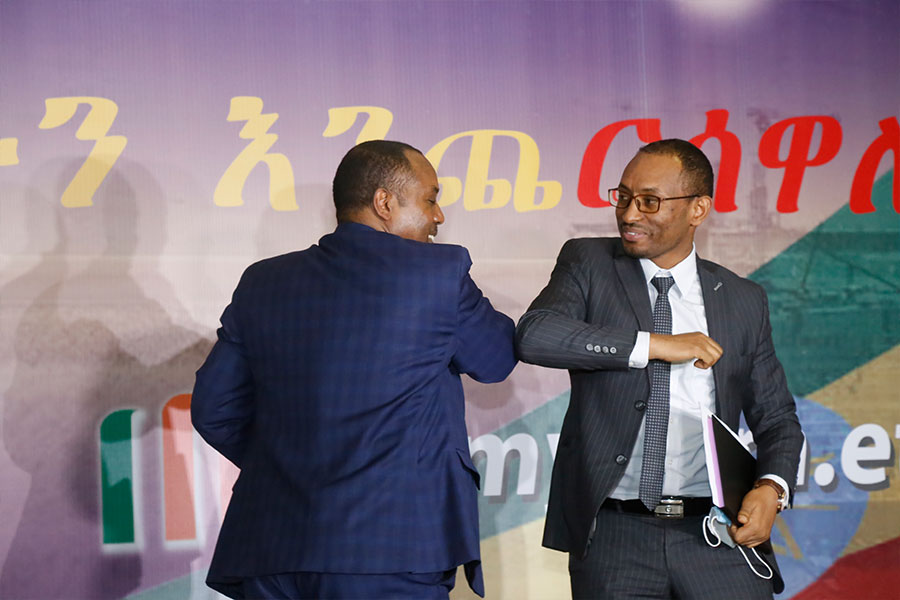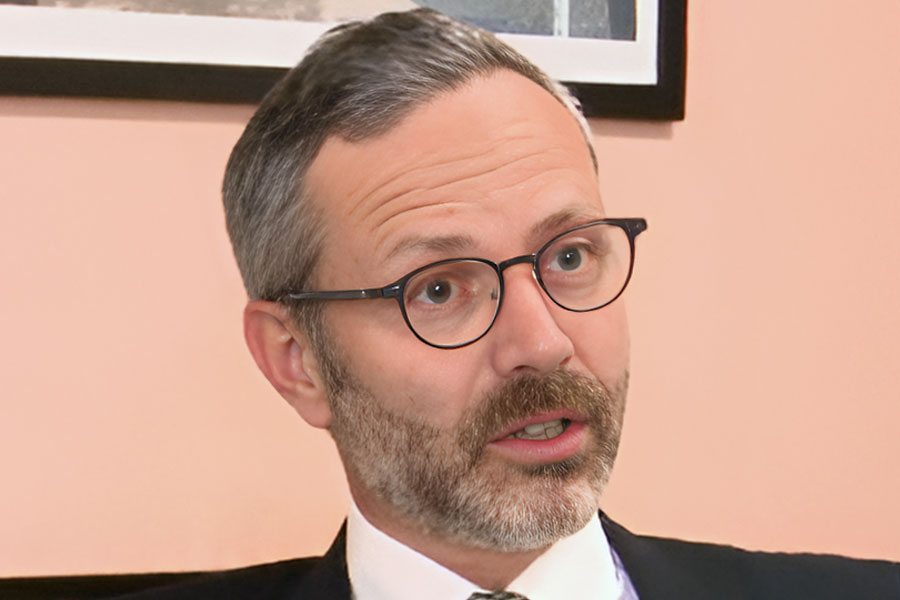
Fortune News | Mar 25,2023
Andreas Eshete (Prof.) was an early riser regardless of how late he stayed up. Punctuality was more than a habit for him; it reflected his disciplined character. In a society where time often took a backseat, Andreas arrived at weddings before the decorations were up.
In his household, table manners were not merely encouraged; they were expected. Phone calls were to be taken outside, and silverware had its proper use. His son, Alula, recalled a childhood lesson when he attempted to cut a steak by stabbing it with a knife. Andreas gently corrected him with a touch of humour: "The animal is already dead." It was a moment that encapsulated his approach to teaching, firm yet playful.
Wit and wisdom were constant companions for Andreas, a towering figure in Ethiopia's academic and political life for over half a century. He was known for his commitment to intellectual rigour, social justice, and the betterment of his country. While he allowed those around him the freedom to make their own choices, he held firm on a few principles such as education, reading, punctuality, and respect for tradition.
"He allowed me to find myself," said Alula. "He was my dad but also a friend."
Born to Meshesha Gebremariam and Eshete Tessema in the Qebena area of Addis Abeba, Andreas spent his formative years with his uncle, Jemaneh Alabso, a librarian near Arat Kilo. This environment immersed him in books and ideas from an early age. His education began at Menelik II Secondary School, on King George VI St., and extended into the home of the Pankhurst family, where he developed a lifelong appreciation for literature, the resilience of women, and gardening.
Winning a scholarship to Williams College in the United States was a turning point. Initially dabbling in economics and political science, he found his true calling in philosophy, a decision he never regretted. The U.S. opened his eyes to the harsh realities of racism and urban poverty, fueling his passion for civil liberties and freedom of expression. He became an active participant in African American gatherings, advocating the civil rights movement. He was a leading member of the Ethiopian student movement, a force in the downfall of the monarchy and an early member of the All Ethiopian Socialist Movement, a.k.a Me'eson in the local wordbook.
Earning a doctorate in philosophy from Yale University, Andreas taught at prestigious institutions, including Brown, UCLA, UC Berkeley, and the University of Pennsylvania, before returning to Ethiopia. His return marked the beginning of a chapter in his homeland's history.
Instrumental in drafting Ethiopia's post-1991 constitution, Andreas worked closely with the late Prime Minister Meles Zenawi. His contributions helped enshrine human rights and multicultural federalism, an achievement he considered among his proudest. While celebrated by many, his work also drew criticism, yet few could deny his intellect.
At Addis Abeba University, he served as a philosophy professor and later as its president, steering the flagship academic institution through a tumultuous period of political and social upheaval. His tenure was marked by intellectual rigour and a steadfast commitment to academic freedom.
"Governments are ad hoc," he often said, "but we must build institutions that outlast generations."
One of his defining positions was his opposition to the government's student intake policy, which prioritised natural sciences (70pc) over social sciences.
"Technology can be imported," he argued. "But authentic, lasting change requires social progress."
Despite his efforts, he was unsuccessful in shifting the policy, but his belief in the primacy of social sciences never wavered.
Colleagues like Atalay Alem (Prof.) recalled Andreas' fearlessness in defying external pressures and his moral compass in aspiring for an academic institution free from political interference. During his tenure, Andreas strongly advocated for women's rights and the inclusion of individuals with disabilities, pushing forward initiatives that left a lasting impact. He also served as the UNESCO Chair for Human Rights, Peace & Democracy at the University and as an advisor to the late Prime Minister Meles.
Intellectual debate was a joy for Andreas. He envisioned the University as a battleground for ideas. However, his compassion and unfamiliarity with the intricacies of the bureaucracy sometimes impeded his administrative decisions. Despite close relationships with high-ranking government officials, he resisted leveraging these connections for institutional favours. As his time at Addis Abeba University drew to a close, he expressed disappointment that neither the government nor the academic community fully grasped his vision of building a truly independent academic institution. This sentiment weighed heavily on him, yet he remained hopeful for the future.
Away from academia and politics, Andreas led a life of modernity in simplicity. Uninterested in material indulgence, he found joy in simple pleasures — hosting gatherings, sending flowers and gateau during holidays. Music was essential to his life, with jazz, soul, blues, and "Tizita" often filling his home. His brother, Napoleon "Muchre" Eshete, fondly remembers the loud music echoing through the house as Andreas read or reflected.
Despite having eight siblings, Andreas grew up feeling like an only child. Later in life, he became especially close to Muchre.
"Nothing in the house was locked," said Muchre recalls, recalling Andreas's disregard for material possessions.
Andreas expressed his fondness through nicknames, flowers, and shared moments rather than grand gestures. Friends like Wedajo Moges, who knew him for over 50 years, remember him as fearless and a humourist. Yet, he had little patience for those who claimed to know more about society than society itself, a mark of his deep sense of justice and humility.
One of his proudest moments was his son's acceptance into Harvard Business School.
"It'll be good to have one of us on the inside," Andreas quipped with characteristic humour, implying his leftist background.
It was not until years later that he told his son he was proud of him, a moment Alula cherishes to this day.
Andreas's humanitarian efforts extended beyond academia. His involvement in the "A'nd Birr le A'nd Wegen" campaign to raise funds to help compatriots affected by a massive drought in the early 2000s resonated with friends like Abiy Fisseha, who served on the committee with him, chaired by Selomie Tadesse, then spokesperson of the federal government. Abiy, who also served in the initiatives to reclaim Maqdala's heritage and celebrate the 100th Anniversary of the Adwa Victory, believes his decision to serve as a regular committee member, demonstrated not only his commitment to Ethiopia's cultural and traditional values but also humility.
A man of deep historical awareness, Andreas admired Ethiopia's patriots and held the Adwa Victory close to his heart, notably as it coincided with his birthday. His last one was a celebration of life and tradition. Family and friends surrounded him, and it was a fitting tribute to a person who valued both deeply. His cousins fondly recall the gathering at his home, filled with music, laughter, and meaningful conversations.
Andreas's signature style was as minimalist as it was distinctive. Often seen in a black turtleneck, wearing Tabac cologne, and smoking a non-filtered Lucky Strike cigarette, he avoided ties and never sported a beard. His appearance was a reflection of his philosophy, uncomplicated yet profound.
He leaves a legacy grounded in education, constitutional development, and human rights advocacy. His contributions have shaped Ethiopia's academic institutions and political life and will continue influencing future generations. His passing marks the end of an era, but his spirit lives on in the many students, colleagues, and friends who had the privilege of knowing him.
Andreas's life came full circle from his early years around Arat Kilo to his final days. He was laid to rest at Holy Trinity Cathedral Church on September 8, 2024, in the very neighbourhood that nurtured his extraordinary life.
PUBLISHED ON
Sep 14,2024 [ VOL
25 , NO
1272]

Fortune News | Mar 25,2023

Radar | Aug 07,2021

Fortune News | May 27,2023

Advertorials | Jul 24,2024

Viewpoints | Jun 24,2023

Dec 22 , 2024 . By TIZITA SHEWAFERAW
Charged with transforming colossal state-owned enterprises into modern and competitiv...

Aug 18 , 2024 . By AKSAH ITALO
Although predictable Yonas Zerihun's job in the ride-hailing service is not immune to...

Jul 28 , 2024 . By TIZITA SHEWAFERAW
Unhabitual, perhaps too many, Samuel Gebreyohannes, 38, used to occasionally enjoy a couple of beers at breakfast. However, he recently swit...

Jul 13 , 2024 . By AKSAH ITALO
Investors who rely on tractors, trucks, and field vehicles for commuting, transporting commodities, and f...

Jul 5 , 2025
Six years ago, Ethiopia was the darling of international liberal commentators. A year...

Jun 28 , 2025
Meseret Damtie, the assertive auditor general, has never been shy about naming names...

Jun 21 , 2025
A well-worn adage says, “Budget is not destiny, but it is direction.” Examining t...

Jun 14 , 2025
Yet again, the Horn of Africa is bracing for trouble. A region already frayed by wars...